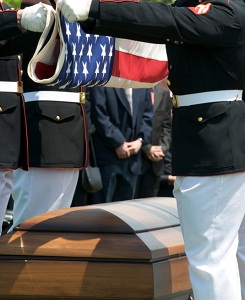 The number of U.S. military suicides reached an all-time high in 2012, with the 349 self-inflicted deaths—nearly one per day—far exceeding the number of combat deaths during the same span.
The number of U.S. military suicides reached an all-time high in 2012, with the 349 self-inflicted deaths—nearly one per day—far exceeding the number of combat deaths during the same span.
Equally troubling is the rate of suicide among military veterans. According to a study by the Department of Veterans Affairs, 22 veterans, on average, take their own lives each day, or one every 65 minutes. People ages 50 and over account for 69% of those deaths.
Clearly, more needs to be done to strengthen mental health care for veterans. We turned to our panel of Topic Experts for answers. Specifically, we asked them the following questions: 1) Aside from the stresses of the battlefield, what factors do you believe contribute to this epidemic? 2) More importantly, what can the military—and society—do to address it? 3) What can be done to ensure active-duty and reserve military, as well as veterans, have access to the resources and support they need? 4) How does this story speak to you as a mental health professional?
Here’s what they had to say:
- Sarah Noel (person-centered therapy / Rogerian therapy): “As a nation that has been at war for a decade, it seems to me that there should be no clinical graduate programs in the country that are not providing some level of education on working with this population. Because we have been at war for such a long time, many in our military have served multiple tours of duty. They have lost limbs, friends, time, a sense of peace and sanity, and they have gained tremendous trauma, nightmares, and haunting memories of death and devastation like most of us will never know. This is a population with very specialized needs, and the trauma training that we get around rape, assault, abuse, domestic violence, etc., does not translate. As a profession, we need to make ourselves ready for working with this population. It seems that the military also needs to make more of a concerted effort to identify its struggling soldiers, connect them to treatment, and make very clear that there will be no punitive actions for engaging in treatment. As long as soldiers are afraid of retribution, they will not seek treatment.”
- Lynn Somerstein (object relations): “The rate of suicide in the military is nearly one tragedy every day and growing, and the ironic fact is that soldiers are most at risk when they are going home. Why should going home be such a problem? Many veterans are experiencing PTSD and depression, and their families and other relationships have suffered while they have been away. If you’ve been in the military for a long time, you forget how to live on the outside. They need our support. A gradual reentry program featuring group and individual therapy might help.”
- Jill Denton (sexuality / sex therapy): “The growing number of U.S. military suicides is indeed a troubling and tragic topic that speaks to me as a therapist who specializes in helping people with posttraumatic stress. (I do not call it PTSD because I don’t view the responses and reactions of these soldiers as a disorder.) Those of us who work with vets are well aware that society is not in danger, although alcoholism, drug abuse, and divorce certainly affect families. It is the military and veterans whose lives are in danger from self-inflicted death. Lt. Col. Dave Grossman’s book On Killing: The Psychological Cost of Learning to Kill in War and Society describes how soldiers learn to kill and how they live with the experience of having killed. I believe we need to understand and address this epidemic beginning with how we train the people who protect us so we can protect them from the agony that shoves them into self-annihilation.”
- Angela Wurtzel (compulsive spending / shopping): “One suicide a day is a startling statistic. It begins to shed light on the hopelessness associated with surviving the torment of trauma and exasperation of serious loss, rejection, and invalidation, among other factors, I am sure. I am not a trauma expert, nor am I familiar at all with the experience of being in combat, witnessing people die, or living on the edge of eminent death, so I cannot speak to those things. I can speak from my heart as a person and a clinician. I can speak to the ability of our minds to push terrible, unimaginable thoughts out and how the images embed themselves in the body. I can speak to the capacity of each of us to engage in denial to make sense of things in our lives, and when we do that, to ourselves or to others, we induce more trauma. I see it in the people I have the opportunity to work with day in and day out, how they have transfigured experiences in their lives to potentially live with them, but, they too, cannot do so completely. They use their bodies as battlefields by starving, purging, cutting, burning, and bingeing. I suppose they reenact trauma that they have not been able to process similarly to those who have decided to take their lives. Without a holding environment, in Winnicott’s words, the military arrive home to a foreign land. Their lives will never be the same, and any one of us who has the chance to create some kind of holding could potentially make a difference one day at a time. It doesn’t have to be big. Just availability, attunement, reliability, consistency, containment, each of which we learned as clinicians, can be extended to a soldier, someone who knows a soldier, or someone who knows someone who knows a soldier. And if you, like myself, have been inclined to help soldiers directly, I have looked into The Soldiers Project (thesoldiersproject.org). It is a big commitment, and one that I am sure would be worth making. There are big things we can do as well.”
- Sarah Swenson (Asperger’s / autism): “Suicide among the ranks of current and former members of our armed forces is a heartbreaking and obvious indication that something is seriously wrong at the very core of our national understanding of both our military purposes and human psychology. War has changed: Today’s battlefields and combat experiences are unprecedented in nature and scope. Has our understanding of the human heart and mind under siege expanded to include these changes? Has it been incorporated into our national defense planning? Clearly, the answer is no. I call upon our nation’s leaders—in all fields, including politics, the military, medicine, and psychology, as well those who understand human spirituality and our search for meaning in this life (as differentiated from those whose expertise is religiously doctrinal)—to open their own hearts and minds to the soaring problem of suicide among members of our armed forces, and to open discussion of the very nature and purpose of our military strategy in these times.”
- Tammy Blackard Cook (grief, loss, and bereavement): “The stigma, especially among men, that is still associated with getting help from a mental health professional presents a huge stumbling block. When will we, as a collective society, understand that health extends well beyond physical health? In working with clients, it’s easy to help them begin to understand the connection between our mind, emotions, and our body. Once we slow down just a little and begin to tune into what happens to our physical body when we are under stress, when we have experienced trauma, or even when we’re emotionally upset, we can sense the subtle and not-so-subtle signs our body sends us that all is not OK. We have to take care of our entire being, which necessitates more than just looking to medication or medical interventions. It’s all connected. There should be no more stigma attached for seeking mental health help than there is in seeking medical help for, say, diabetes. From another perspective, the insurance most veterans have, Tricare, has reduced its rates dramatically over the years. In an informal survey we did here in North Carolina, we had clinicians reporting an hourly rate of $55 (for experienced, seasoned clinicians). Add the low reimbursements to the fact that sometimes dealing with government payors can be difficult and there are not a lot of clinicians out there willing to serve these clients. To me, this underscores once again the fact that mental health is undervalued, underappreciated, and therefore underserving the need that’s out there.”
- Blake Edwards (family therapy / family problems): “I find the Veterans Health Administration’s progress in the development of a military family life counseling program (piloted under the name of Military Family Life Consulting) to be an innovative, proactive, and sensible layer to building a more effective, integrative approach for treating mental health concerns among the military population. The MFLC program was created in 2004 in an effort to provide a supportive, nonclinical outreach service to military personnel and their families. This program has built upon other program initiatives in the VHA, such as, for instance, the development of the Readjustment Counseling Service, which began in 1979. Through individual coaching, psychoeducational groups, and other creative methods, the MFLC program utilizes a short-term, solution-focused approach, intending to circumvent some of the remaining stigma within military culture by providing informal outreach and linking activities in order to connect military personnel and their families to therapeutic supports at critical junctures, such as immediately preceding deployment as well as in the facilitation of reintegration. MFLCs are nimble in the provision of services, especially in not being constrained within static facility environments. MFLCs also provide coaching and psychoeducation in areas including couple/marriage issues, parenting, anger, conflict resolution, grief, and loss. The MFLC program is intended to augment other layers along the VHA’s continuum of care. Nearing the end of its first full decade of implementation and ongoing development, the MFLC program appears to add an effective, affordable, and flexible way for fully credentialed mental health professionals to reach out to military personnel and their families, provide them timely support and coaching, and provide linkages, when beneficial, to additional treatment services.”
- Shirley Katz Leon (body image): “Let me preface my response to this topic with a clarification: I am no expert in military experiences. I can only offer conjecture based on assumptions about what life in the military is like. I can imagine that preparing a human for service involves creating a strong sense of belonging to a group, a clear awareness of power hierarchies, and the discipline to behave according to the expectations of those in power, as well as the strength to react to the call of duty or request from superiors without hesitation. Everything I know about military experiences is about thinking and doing, not feeling. With the strong pull to identify as a member of the military as the primary motivator, an individual can be trained to repress vulnerability, to be in the moment with a readiness to respond with action, but without their own judgment. Interestingly, this sets up a group and intrapersonal valuing logic and action, minus emotion and personal need, other than the need to belong and be approved of or survive, according to group or power-based standards and expectations. So what happens to the human, more vulnerable emotions such as sadness or fear, and the propensity to individuate? Do they disappear? What is repressed will find a way to express itself, sometimes with great force, emerging when one is least prepared to handle the intensity of what was being denied or ignored. Sadness repressed can turn into depressed mood. Fear repressed can turn to impulsivity or even bravado or excessive violence. … The mentality of belonging to a group and following the example of peers must be a compelling factor and a stronger motivating principle in some people or cultural contexts such as the military. But the weakness of such a context is that the individual becomes a follower, and with regard to an epidemic of suicide, this is very dangerous. Witnessing suicide or experiencing the loss of someone to suicide makes an individual more vulnerable to completing suicide, for a multitude of reasons. In an environment of peer- and power-controlled group cohesion, above all else, one would theoretically be vulnerable to reenacting the behaviors and choices of others, even if self-destructive. Putting it all together, what I am conjecturing is that the experience of belonging in the military creates a self-oppressive, emotionally repressive (but volatile), consciousness-numbing effect that enables a strong group belonging/following mentality. Combine that with the learned ability to act violently without hesitation, judgment, or processing of future consequences and you have a recipe for increased suicidal behavior. In order to support people in the military, the culture of invulnerability would have to change and individuality would have to be more accepted, with supports in place for people to handle fear, anxiety, loneliness, sadness, trauma, etc., in a respectful and humane manner. I’m not sure that is possible, as it seems contradictory to the larger goal for which these individuals are being engaged.”
What do you think about the epidemic of suicide among military and veterans? Do you agree or disagree with our Topic Experts? What would you add to the conversation? What steps would you take to address the problem? Please let us know in the comments section below.
© Copyright 2013 GoodTherapy.org. All rights reserved.
The preceding article was solely written by the author named above. Any views and opinions expressed are not necessarily shared by GoodTherapy.org. Questions or concerns about the preceding article can be directed to the author or posted as a comment below.

 Topic Expert Roundup: Therapists React to DSM Changes with Concern
Topic Expert Roundup: Therapists React to DSM Changes with Concern Topic Expert Roundup: Therapists Seek Solutions in Aftermath of Newtown
Topic Expert Roundup: Therapists Seek Solutions in Aftermath of Newtown Meet the GoodTherapy.org Topic Experts: Lynn Somerstein
Meet the GoodTherapy.org Topic Experts: Lynn Somerstein